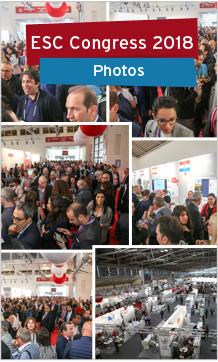| [Türkçe] | |
|
 |
| Turkish Society of Cardiology Young Cardiologists Bulletin Year: 1 Number: 1 / 2018 |
|
|
This year cardiologists attending to ESC Congress witnessed a shift in trend regarding hot-line sessions. Last year RCT’s that focused on a yet-to-be approved drug for inflammation and ablation in small subset of patients were on the stage. However, this year hot-line sessions were more related to questions that we face in everyday clinical practice. The rising star of the Congress was definitely digital health. Cardiologists had the opportunity to learn more about big data, electronic health records, wearable technologies and mobile apps. It is almost certain that ESC will reserve bigger and bigger digital health area during the upcoming annual congress. By clicking this link (https://www.medscape.com/viewarticle/901520) you can access to the interview with Prof Martin Cowie who is the chair of the ESC’s new digital health committee. Social media was another winner of the congress. During 5-day meeting, there were 50.083 tweets using the official hashtag (#ESCCongress) which reached 32 million accounts (impression) according to data provided by Symplur. Two big RCT were related to Aspirin and its role on primary prevention. In the ARRIVE trial (https://www.thelancet.com/article/S0140-6736(18)31924-X/fulltext) Aspirin at a daily dose of 100 mg did not reduce cardiovascular (CV) and cerebrovascular events in non-diabetic patients with without prior CV events but with moderate CV-risk. ASCEND trial randomized 15.480 diabetic patients with no evident CV disease either receive Aspirin at a daily dose of 100 mg or matching placebo. Aspirin significantly reduced primary CV events but also significantly increased the major bleeding events (https://www.nejm.org/doi/full/10.1056/NEJMoa1804988). Another arm of ASCEND trial evaluated the effect of omega-3 fatty acid on vascular events. 1 g daily omega-3 fatty acid supplementation compared to matched placebo did not reduce the composite endpoint of vascular events including non-fatal MI, stroke, transient ischemic attack and vascular death. GLOBAL-LEADERS trial evaluated the idea to replace aspirin for secondary prevention by a drug which is more specific and reliable antiplatelet therapy. However, ticagrelor in combination with aspirin for 1 month followed by ticagrelor alone for 23 months was not superior to standard 1-year dual antiplatelet therapy followed by 1 year of aspirin monotherapy in terms of the composite endpoint of all-cause mortality or new Q-wave myocardial infarction at 2 years (https://www.thelancet.com/journals/lancet/article/PIIS0140-6736(18)31858-0/fulltext). Another study with negative results was MITRA-FR. Among patients with secondary severe mitral valve regurgitation due to chronic HF with reduced EF, percutaneous mitral-valve repair in addition to medical therapy did not reduce the rate of death or unplanned hospitalization for HF at 1 year compared to medical therapy alone (https://www.nejm.org/doi/full/10.1056/NEJMoa1805374). In COMMANDER-HF trial, the authors found that rivaroxaban at a dose of 2.5 mg twice daily did not reduce the rate of death, MI or stroke compared to placebo among patients with worsening HF, reduced LVEF, CAD but without AF. After this trial it was obvious that thrombin inhibition with anticoagulation did not benefit to patients with worsening HF and free of AF (https://www.nejm.org/doi/full/10.1056/NEJMoa1808848). Possible game changer evidence came from POET study. In patients with left-sided endocarditis who were in stable condition, changing to oral antibiotic treatment was non-inferior to continuing intravenous treatment in terms of all-cause death, unplanned cardiac surgery, embolic events or relapse of bacteremia at 6 months In SCOT-HEART trial, the use of coronary CT-angiography in addition to standard care in patients with stable chest pain in resulted in significantly lower rate of death from CAD or non-fatal MI at 5 years compared to standard care alone. An interesting finding was that there was no increase in the rate of coronary revascularization In High-STEACS trial the authors evaluated whether hs-Troponins are beneficial or harmful in over 40000 consecutive patients with suspected ACS. Introduction of the high-sensitivity assay prompted reclassification of 1771 (17%) patients with myocardial injury; however, only a third of these patients had a diagnosis of type 1 MI and the incidence of subsequent MI or death from cardiovascular causes within 1 year was not changed by introduction of this high-sensitivity assay ATTR-ACT study evaluated the effect of Tafamidis in a group of patients with transthyretin amloid cardiomyopathy. Tafamidis was associated with a reduction in all-cause mortality, CV hospitalization and cognitive decline as compared to placebo. And of course guidelines… During ESC 2018 4 practical guidelines were announced including the on the management of arterial hypertension, syncope, CVD during pregnancy and myocardial revascularization. In addition a new consensus document updating universal definition of myocardial infarction is released. You can have a look at those new guidelines by clicking this link (https://www.escardio.org/Guidelines/Clinical-Practice-Guidelines). |
| 2026 © Turkish Society of Cardiology. |

